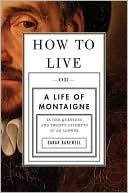More on this book
Community
Kindle Notes & Highlights
Read between
January 1 - January 7, 2020
He was so determined to get to the bottom even of a phenomenon that was normally lost by definition—sleep—that he had a long-suffering servant wake him regularly in the middle of the night in the hope of catching a glimpse of his own unconsciousness as it left him.
Being noble was not a je ne sais quoi of class and style; it was a technical matter, and the main rule was that you and your descendants must engage in no trade and pay no taxes for at least three generations.
He felt ordinary, but knew that the very fact of realizing his ordinariness made him extraordinary.
It raised in his mind, perhaps for the first time, a question that would haunt the entire Essays in varying guises: whether it was better to win an enemy’s respect by an open display of defiance, or to throw yourself on his mercy and hope to win him over by submission or an appeal to his better self.
What did it matter if a madman’s idea of the world was skewed, so long as he was happy?
Montaigne inclined more towards a position known as Fideism, which placed no reliance at all on human reason or endeavor, and denied that humans could attain knowledge of religious truths except through faith. Montaigne may not have felt a great desire for faith, but he did feel a strong aversion to all human pretension—and the result was the same.
Ordinary dogmatic Skepticism asserts the impossibility of knowledge: it is summed up in Socrates’s remark: “All I know is that I know nothing.” Pyrrhonian Skepticism starts from this point, but then adds, in effect, “and I’m not even sure about that.”
As Friedrich Nietzsche would remark centuries later, most of the genuinely valuable observations about human behavior and psychology—and thus also about philosophy—“were first detected and stated in those social circles which would make every sort of sacrifice not for scientific knowledge, but for a witty coquetry.”
For a husband to behave as an impassioned lover to his wife was thought morally wrong, because it might turn her into a nymphomaniac. Minimal, joyless intercourse was the proper sort for marriage. In an essay almost entirely about sex, Montaigne cites the wisdom of Aristotle: “A man … should touch his wife prudently and soberly, lest if he caresses her too lasciviously the pleasure should transport her outside the bounds of reason.” The physicians warned, too, that excessive pleasure could make sperm curdle inside the woman’s body, rendering her unable to conceive. It was better for the
...more
Looking back at two such different writers as Montaigne and Tasso, and admiring both, Romantics were prepared to go along with Montaigne’s belief that Tasso had blown his own mind with poetry. They could understand Montaigne’s sadness about it. What they could neither understand nor forgive was his irritation. Romantics did blinding brilliance; they did melancholy; they did intense imaginative identification. They did not do irritation.
Zweig knew that Montaigne disliked preaching, yet he managed to extract a series of general rules from the Essays. He did not list them as such, but paraphrased them in such a way as to resolve them into eight separate commandments—which could also be called the eight freedoms: Be free from vanity and pride. Be free from belief, disbelief, convictions, and parties. Be free from habit. Be free from ambition and greed. Be free from family and surroundings. Be free from fanaticism. Be free from fate; be master of your own life. Be free from death; life depends on the will of others, but death on
...more
He was known as a man who would listen thoughtfully to all sides, whose Pyrrhonian principle was to lend his ears to everyone and his mind to no one, while maintaining his own integrity through it all.
Nihilists were people who, having no God, threw bombs and advocated the destruction of the existing social order. They were a kind of revolutionary wing to the Skeptics’ party, or Skeptics turned bad. If they took charge, nothing would be preserved and nothing could be taken for granted.
Catherine de’ Medici was always a believer in the idea that if everyone could just sit down and talk, problems would go away.
Diderot would make almost the same observation of Montaigne in a later century: “His book is the touchstone of a sound mind. If a man dislikes it, you may be sure that he has some defect of the heart or understanding.”
A new English translation would be urgently needed, since the two otherwise excellent ones that dominate the market now, by Donald Frame and M. A. Screech, are firmly of the Bordeaux Copy era.
No wonder he himself was driven to say that “every abridgment of a good book is a stupid abridgment.”
There can be no really ambitious writing without an acceptance that other people will do what they like with your work, and change it almost beyond recognition.
Life should be an aim unto itself, a purpose unto itself.


